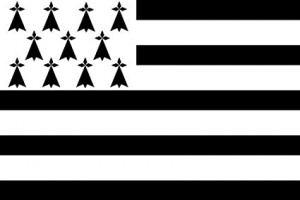Language/Breton/Grammar/Negation
Hi Breton learners! 😊
In this lesson, we will learn about negation in Breton grammar. Negation is an essential part of any language, and in Breton, it is not too complicated. By the end of this lesson, you will have a solid foundation in negation and be able to express negative ideas in Breton with confidence. Let's get started!
Consider exploring these related pages after completing this lesson: Personal Pronouns, How to Use "Be", Pronouns & How to Use Have.
Negative Particle[edit | edit source]
In Breton, we use the negative particle ne before the verb to make it negative. The use of ne is obligatory in written Breton, but in spoken Breton, its usage has relaxed. The use of ne is also optional in some expressions.
Here are some examples of ne in negative constructions:
| Breton | Pronunciation | English |
|---|---|---|
| Ne oa ket mad ar gwin | ne oa ket mad ar gwin | The wine was not good |
| Ne vez ket bleo | ne vez ket bleo | It's not (going to be) cool |
| Ne gomprenan ket | ne gomprenan ket | We don't understand |
| Ne zeuh ket | ne zeuh ket | (He/She) does not come |
Notice how we always use ne before the Breton verb in these examples.
Usage exceptions[edit | edit source]
When the verb begins with a vowel or the letter ‘h,’ we add n’ instead of ne.
Here are some examples to make it clearer:
| Breton | Pronunciation | English |
|---|---|---|
| N'eo ket kalz an tren | n'eo ket kalz an tren | The train is not very frequent |
| N'eus ket avel | n'eus ket avel | There is no wind |
| N'on ket gouestlet | n'on ket gouestlet | We are not tired |
Notice how n' is used before vowels and the letter ‘h’ in these examples.
Another negative particle[edit | edit source]
Breton also allows the use of negative particles like ebet or netra. These are synonymous with the French rien (nothing) and negate the entire sentence rather than the verb alone. The verb does not have to be negative in these cases.
Here are some examples:
| Breton | Pronunciation | English |
|---|---|---|
| Ebet den a gompren | ebet den a gomɥren | No one understands |
| Netra zo adsavoet | netra zo adsavɔət | Nothing has been saved |
| Ebet karned | ebet karned | No meat |
Notice how ebet and netra negate the entire sentence.
Exceptions in spoken Breton[edit | edit source]
In spoken Breton, the use of ne can be relaxed. In informal situations, the use of just a glottal stop is common to replace ne. It is also common to use forms without ne, such as ken for ne c'hallit ket (you can't).
Here are some examples:
| Breton | Pronunciation ( | English) |
|---|---|---|
| Illa, ne'ma ket ar mam gozh | Illa, ema' ket ar mam gozh (with glottal stop) | Yes, the mother isn't old |
| Mat eo | Ma't eo (with glottal stop) | It's okay |
| Tennet eus-me | Tennet eus-me | I did not leave (informal) |
Notice the use of the glottal stop and ken instead of ne c'hallit ket.
Examples[edit | edit source]
Here is a dialogue to practice negation:
- Person 1: Piv 'ta ac'hanomp hor bloavezhnoù foar? (Who's starting our difficult years?)
- Person 2: Me ne deuz ket, med tamm haha! (I'm not coming, but in a bit haha!)
- Person 1: Peseurt evezh 'zo ganeoc'h? (What's wrong with you?)
- Person 2: N'eo ket netra. (There's nothing wrong.)
- Person 1: Petra deus graet dirakout? (What have you done to him/her?)
- Person 2: N'em eus ket graet netra! (I haven't done anything!)
Practice[edit | edit source]
Now try to make some sentences using negation. Use Find native speakers and ask them any questions if you have any. Practice makes perfect!
Conclusion[edit | edit source]
Congratulations, you made it to the end of this lesson! You now understand how to use negation in Breton. Don't forget to check out more Grammar articles for Breton learners. To improve your Breton Grammar, you can also use the Polyglot Club website. Find native speakers and ask them any questions!
➡ If you have any questions, please ask them in the comments section below.
➡ Feel free to edit this wiki page if you think it can be improved. 😎
Sources[edit | edit source]
Well done on mastering this lesson! Don't miss these related pages to expand your knowledge: Gender, Say Hello and Greetings in Breton, Give your Opinion & Plurals.
Other Lessons[edit | edit source]
- Pronouns
- Questions
- How to Use Be
- How to Use Have
- Adjectives
- Conditional Mood
- Plurals
- Future Tense
- Gender

